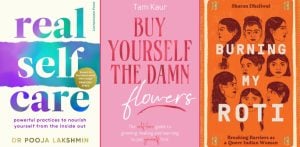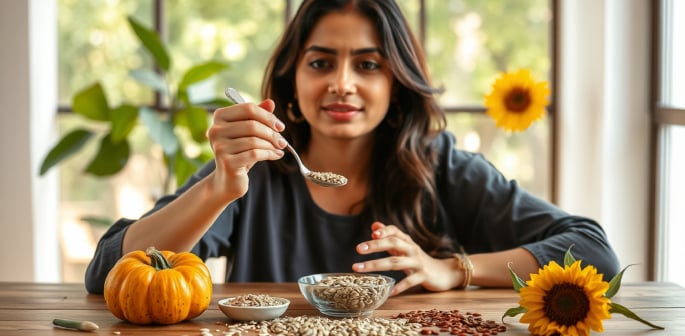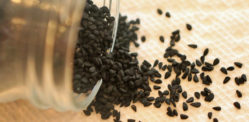Many experts agree that these seeds offer valuable vitamins.
For many South Asian women navigating hormonal ups and downs, from erratic periods to persistent PMS, the search for natural remedies is ongoing.
Amid wellness trends flooding social media, one practice steadily gaining attention is seed cycling.
Touted as a natural hormone balancer, this ritual involves rotating different seeds according to your menstrual cycle.
Devotees claim it helps regulate periods, ease symptoms of conditions like PCOS, and even boost fertility.
But as appealing as it sounds, does seed cycling work?
Or is it another wellness fad with little science to back it up?
Understanding how seed cycling works starts with recognising how female hormones shift throughout the month.
The method splits the menstrual cycle into two phases and assigns different seeds to each.
It promises to nudge oestrogen and progesterone into balance using only food.
With flax, pumpkin, sesame and sunflower seeds taking centre stage, the approach appears simple and accessible.
Yet many are left wondering if this natural remedy is rooted in real results or just a healthy-sounding myth.
What is Seed Cycling?
 Seed cycling is a naturopathic method where women consume specific seeds based on the menstrual cycle’s phases.
Seed cycling is a naturopathic method where women consume specific seeds based on the menstrual cycle’s phases.
During the follicular phase, typically days 1 to 14, flax and pumpkin seeds are included in daily meals.
These are then swapped for sesame and sunflower seeds from days 15 to 28, known as the luteal phase.
Each set of seeds is believed to support the body’s natural hormonal shifts.
The idea is that certain seeds contain nutrients and compounds that can encourage a healthier hormone balance.
For instance, flaxseeds are rich in lignans, a type of phytoestrogen, which can either mimic or block oestrogen depending on what your body requires.
Pumpkin seeds offer a healthy dose of zinc, believed to support progesterone production later in the cycle.
In the second half, sesame seeds continue providing lignans, while sunflower seeds supply vitamin E and selenium.
These are nutrients linked to detoxification and hormone support.
This rhythm of rotating seeds in sync with the cycle is designed to mirror the body’s needs.
The routine may sound like a gentle, food-based intervention, but its underlying promise is bold.
It claims to regulate hormones and ease hormone-related issues naturally.
How Is It Supposed to Work?
 Seed cycling works on the assumption that food can influence hormone levels in subtle yet effective ways.
Seed cycling works on the assumption that food can influence hormone levels in subtle yet effective ways.
Flax and pumpkin seeds, taken during the follicular phase, are thought to enhance oestrogen metabolism and prepare the body for ovulation.
Flax’s phytoestrogens may help modulate oestrogen levels, either increasing or decreasing them depending on your hormone profile.
Meanwhile, pumpkin seeds are praised for their zinc content, said to lay the groundwork for healthy progesterone levels later on.
In the luteal phase, sesame and sunflower seeds step in to support progesterone production.
Sesame seeds are another source of lignans and zinc, both nutrients linked to hormonal support.
Sunflower seeds bring vitamin E and selenium into the mix. Some believe these help clear excess oestrogen and maintain progesterone.
These nutrient-rich seeds are often ground up and added to smoothies, yoghurt or porridge, making it an easy lifestyle shift.
However, the logic behind the method remains rooted more in nutritional theory than in scientific proof.
The practice draws on what is known about the seeds’ nutrient profiles rather than their proven hormonal impact.
Claimed Benefits and Growing Hype
 Supporters of seed cycling claim it offers a host of benefits, especially for women dealing with hormonal imbalances.
Supporters of seed cycling claim it offers a host of benefits, especially for women dealing with hormonal imbalances.
Some say it helps to regulate irregular periods, reduce PMS symptoms and manage PCOS and endometriosis.
Others believe it can ease the transition through menopause and improve fertility.
The method’s appeal lies in its simplicity.
No supplements, no medication, just seeds added to your diet in a specific order.
Online wellness communities are full of testimonials from women who say seed cycling reduced cramps, improved their skin or made their periods more predictable.
These stories have fuelled interest, particularly among those seeking holistic, food-based interventions.
In South Asian households, where natural remedies are often trusted, seed cycling fits into a familiar narrative of food as medicine.
Yet for all its popularity, these claims remain largely anecdotal.
While it’s entirely possible that some women feel better after trying seed cycling, there is little concrete data to explain why.
Personal results may vary widely depending on overall diet, stress levels and underlying health conditions.
What Does the Science Say?
 Despite its growing following, seed cycling lacks strong scientific support.
Despite its growing following, seed cycling lacks strong scientific support.
There are no large-scale, peer-reviewed studies directly linking this practice to meaningful hormonal changes.
Some small studies suggest that flaxseed alone may help improve cycle regularity and reduce symptoms like breast pain.
However, these effects are modest and not unique to seed cycling as a structured method.
One 2023 pilot study involving women with PCOS found that a daily seed blend was associated with improvements in BMI, menstrual regularity and reduced excess hair growth.
While promising, the study’s small size and limited duration mean its findings are not conclusive.
The broader scientific community remains cautious, noting that while seeds are nutritious, their direct impact on hormones is unproven.
The evidence for seed cycling is therefore largely nutritional rather than hormonal.
Many experts agree that these seeds offer valuable vitamins, minerals and healthy fats, but their influence on hormone levels remains uncertain.
Nutritional Value Beyond Hormones
 Even without guaranteed hormonal benefits, incorporating seeds into your diet can still support overall health.
Even without guaranteed hormonal benefits, incorporating seeds into your diet can still support overall health.
Flax and sesame seeds are high in lignans, fibre and omega-3 fats.
These are known to aid digestion, reduce inflammation and support heart health.
Pumpkin seeds offer magnesium, iron and zinc, while sunflower seeds are packed with vitamin E and selenium.
These nutrients contribute to better energy levels, skin health and even mood regulation.
For South Asian women who may already use seeds like flax and sesame in traditional dishes, seed cycling can feel like a familiar habit with a modern twist.
While the hormonal claims are debatable, the nutritional perks are clear.
Including seeds as part of a balanced, diverse diet can be a sustainable wellness choice.
Whether or not you follow the seed cycling schedule precisely, these foods can still play a valuable role in overall well-being.
Trend or Tool?
 Seed cycling may not be the hormone miracle some claim it to be, but it isn’t without merit.
Seed cycling may not be the hormone miracle some claim it to be, but it isn’t without merit.
For women experiencing hormone-related discomfort, adding flax, pumpkin, sesame and sunflower seeds to the diet is safe and potentially beneficial.
It offers a food-first approach to wellness that aligns well with many South Asian dietary traditions.
However, for those with significant or persistent hormonal imbalances, medical advice should remain the first step.
There is currently no strong evidence that seed cycling alone can replace professional care or medical treatment.
Still, it may serve as a complementary strategy that adds nutritional value and a sense of routine.
At best, seed cycling can be a gentle way to tune into your body and nourish it through food.
At worst, it is a harmless trend with nutritional upsides.
Either way, it highlights the growing interest in natural, female-focused wellness and the need for better research to support it.






























































